Made in Canada—Free Shipping Over $50 CA & US
Made in Canada—Free Shipping Over $50 CA & US
Made in Canada—Free Shipping Over $50 CA & US

August 30, 2017 5 min read 1 Comment
“What is your dream?”
That is the question that Kelly Perreault asked a group of Maasai community members while standing under an acacia tree in Endulen, Tanzania last year. Kelly was there with Rocky soap maker Adrian Cohen as part of Project SHINE.
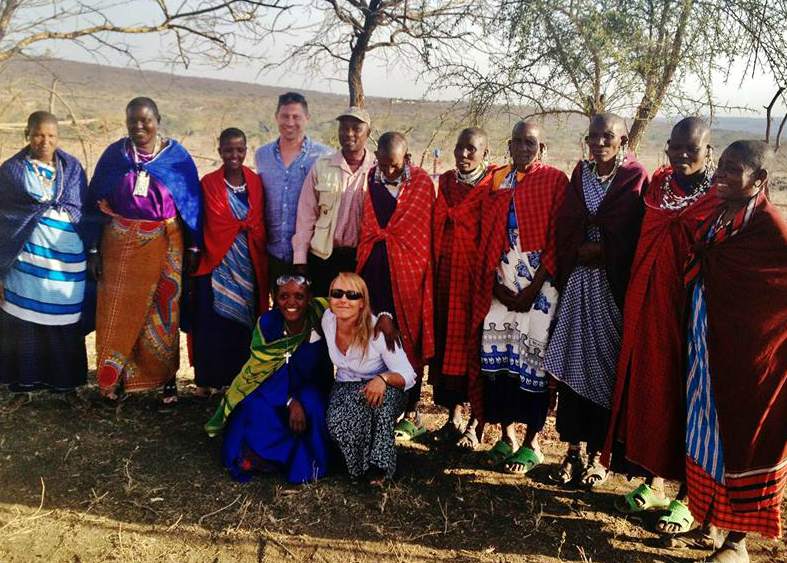
Adrian Cohen, Rocky Soap Maker & Dr. Sheri Bastien from the University of Calgary posing with newly taught soap makers in Tanzania.(Photo credit: Thomas Kadogo)
Project SHINE builds positive change.
Led by Dr. Sheri Bastien from the University of Calgary (U of C), and joined by others from Norway and Tanzania, Project SHINE (Sanitation and Hygiene Innovation in Education) brings school-based participatory science education and an empowerment and social entrepreneurship model of health promotion. Simply, they work with youth to start to change cleanliness practices and stop sickness from spreading.
Project SHINE also works with community members to build sustainable models of good health through hygiene. Workers honour traditional knowledge of the Endulen people and focus on positive change.
The U of C has also helped bring biosand water filters to Endulen. With this clean water and Project SHINE education, hand washing becomes possible. Regular hand washing, according to UNICEF, can reduce bouts of diarrhea by 50% and decrease occurrence of other illnesses like pneumonia. For many tiny babies and the elderly, diarrhea equals death. Project SHINE is here to help change that.
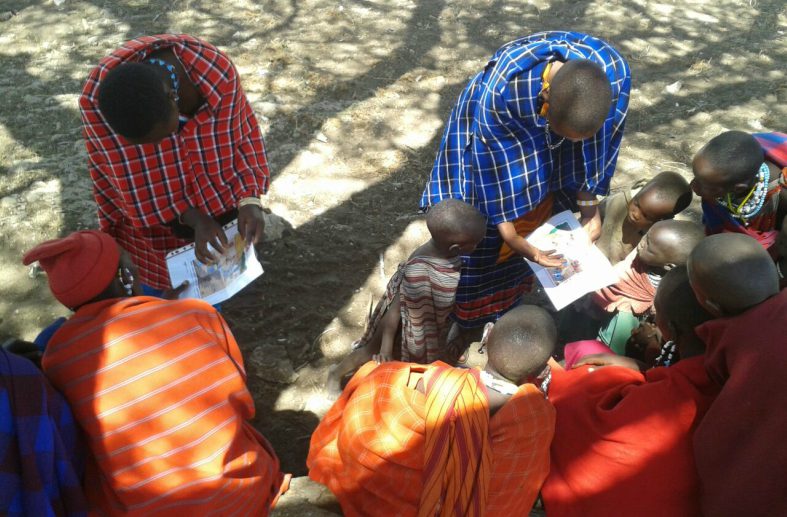
Health and sanitation educators teaching the Maasai people. (Photo credit: Tina Paasche)
Endulen, Tanzania
The Maasai people of Endulen live in the UNESCO World Heritage designated Ngorongoro Conservation Area (NCA). Tending to their livestock is highly important, and to look after their animals, the people live near them.
For Kelly, she noticed striking physical differences between life in Endulen and life back home in Canmore. The people have very little compared to what we are used to: no clean running water, no heat or electricity, and no sewer systems. Before Project SHINE, some households had pit latrines and others had a bucket or nothing at all, and no place to wash up. Footwear is rare.
Local practice is to not name children for three months after they have been born, because so many die. Disease control and changes in hygiene is already changing that, so children can grow up safely and in good health. Many youth attend boarding schools, and this is where Project SHINE workers interact with students teachers and elders.
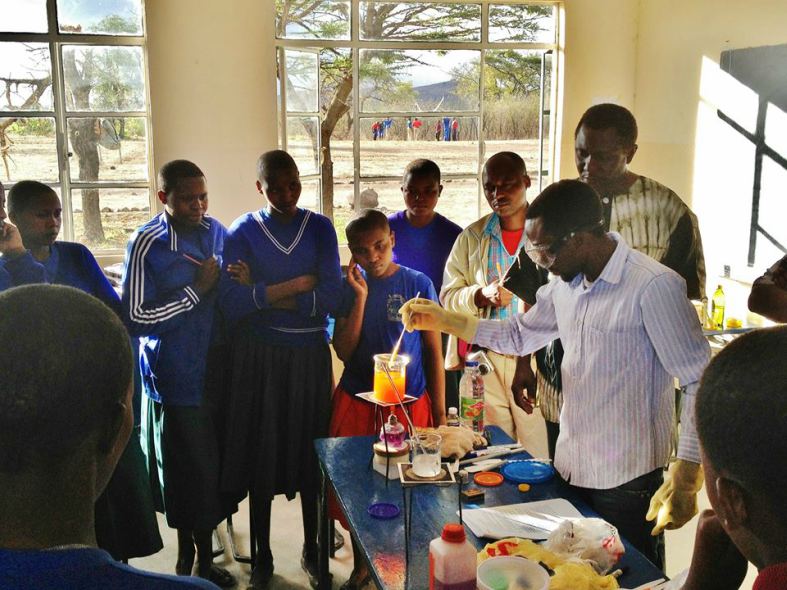
Educating Maasai boarding school youth.(Photo credit: Dr. Sheri Bastien)
From Arusha to Endulen
After sourcing locally-harvested oils and sodium hydroxide, a key ingredient to the soap-making process, Kelly and Adrian travelled from the regional centre of Arusha to the NCA. In that four-hour trip, worlds transformed. Gone were the city’s makeshift buildings and in their place appeared mud huts with thatched roofs. Maasai women walked with children strapped to them. Others gathered and carried massive bundles of deadfall wood on their backs.
Why were Kelly and Adrian there?
Simply, Kelly and Adrian were in Endulen to share their skills. Adrian had been before, in 2015. As we were already involved in African outreach by donating made-in-Canmore soap, our decision to join the Tanzanian project was simple. Namely, we could share our skills and help the local people go from making their own soap to running a sustainable business.
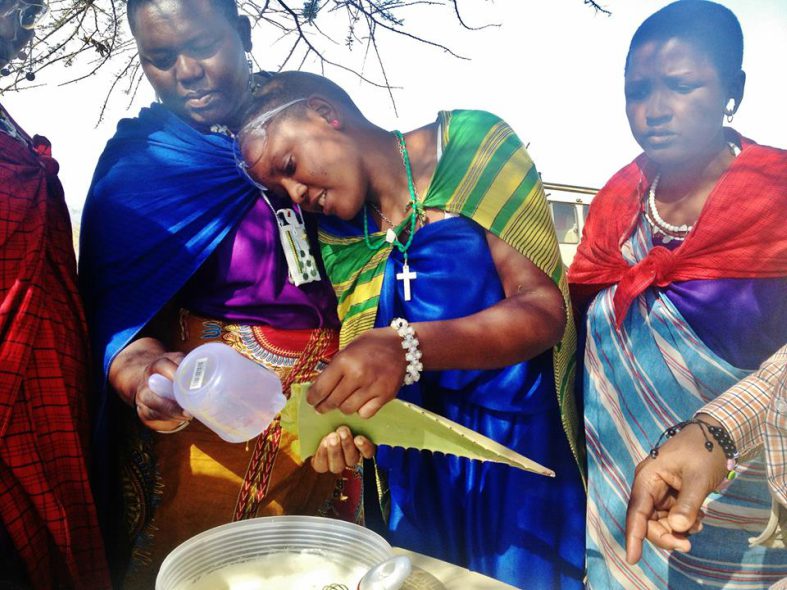
Making soap with an aloe vera plant. (Photo credit: Dr. Sheri Bastien)
Why us?
We rely on simple, natural ingredients in our handmade-in-Canmore soap. Good for developing areas too, simple means easy to source and use. And natural means no chemicals or other additives that are potentially harmful to humans and their environments.
In Canada, we use canola and other oils that are easy for us to access. In Tanzania, transport is more difficult, and there are rules about what can be harvested from the World Heritage site land where the Maasai live. Tasked with finding local ingredients, Adrian collected peanut, corn, and sunflower oils in Arusha, and adapted his recipes for them.
Adrian helped teach Endulen people how to make soap. Kelly’s background in Sales helped create an economically sustainable local project. She didn’t want to be another well-meaning outsider showing up with “solutions” before understanding what the people needed. Instead, she did her research and came up with a question.
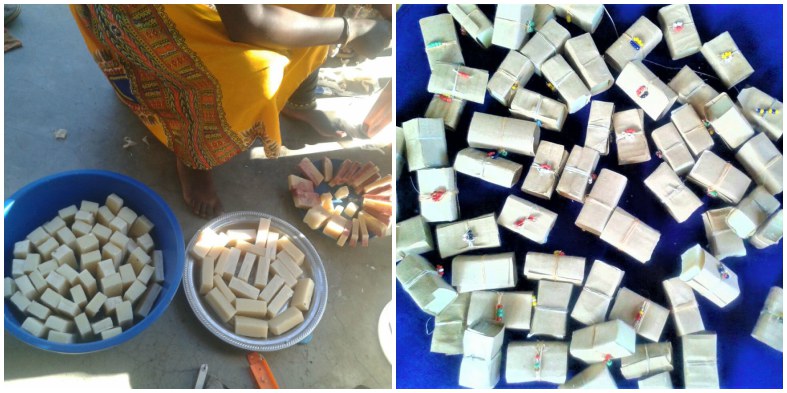
Final soap dried and packaged. (Photo credit: Saningo Olemshumba (Godwin)
Another local business is born.
Kelly was embraced at the beginning of her two-day workshop by community members, eldest to youngest, as each looked deeply into her eyes. People sat on upside-down buckets. “Women were dressed in full regalia, in their iconic beads and Shuka cloth,” Kelly describes, clearly moved. “I paused to take it all in.” Kelly then asked the Maasai people, “What is your dream?”
Using an interpreter and a flipchart tied to branches of the acacia tree, she learned that the dreams of the Maasai people that she heard that day on the savannah are very closely tied to ours.
Ewong’an: Bringing into the light.
The Maasai expressed wanting “to help the less fortunate” and “to give my children a better life than I’ve had.” They yearn to help the sick and orphans, and help their communities. Kelly took notes, and, driven by the group, broke them down into goals and actions.
In Kelly’s words, there was no dictating from Canadian outsiders, “This is how we do things.” In their circle under the acacia tree, Kelly recollects, “We spoke of obstacles and opportunities, and then we derived a plan.”
“We have polar opposite lives but are so much the same.” Kelly Perreault, about the Maasai people of Endulen.
With Kelly’s facilitation, Endulen community members named their soap Ewong’an, meaning, “Bringing into the light.” They identified local safari lodges that might want the soap, and Kelly set up meetings. Our designer created a logo for Ewong’an, using images chosen by local Maasai people. One lodge is now using the soap in their room amenities program, a year later. “In our world, things would move more quickly,” says Kelly.
It’s not a fast process. With Project SHINE help, though, the Endulen people have clean water and healthier hygiene habits. They now have a sustainable soap business—improving both their health and their community’s economy—which our Kelly and Adrian have helped them to create.
Why we care?
Tanzania is worlds away for most of us. With our own day-to-day troubles, sometimes it’s hard to pay attention. Our situations are so different, but what we want for our communities—health and sustainability—is the same. We see beauty in our Endulen friends’ dreams being so much like ours, and simply sharing our skills can make a lifetime of positive change—on both sides.
We’re gearing up to work with Project SHINE in India to help in similar ways. Adrian remains strong in his support of locally-sourced soap making. Changed by her place in the project, Kelly has a new role in our company: Dream Manager.
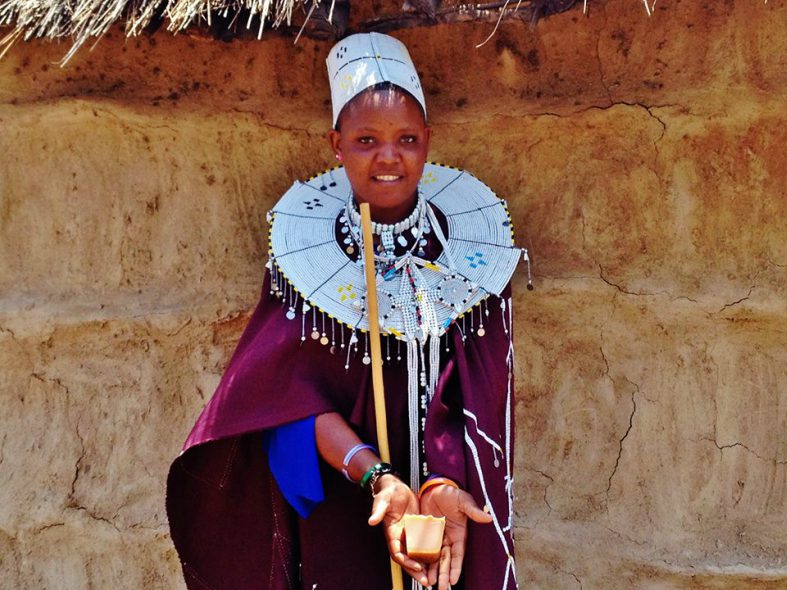
(Photo credit: Dr. Sheri Bastien)
How you can help?
We commit to continuing to help the Endulen community. Will you join us? For September, we’ve developed a new feature soap bar called the African Shea Bar.
For every bar sold, we’ll send $1 to the peoples’ soap initiative in Endulen.
Inspired by our time in Africa, the African Shea Bar includes organic African shea butter. We’ve added a swirl of red clay, to reflect our respect for its use in Maasai culture. Cinnamon bark essential oil—spicy sweet, warm, and stimulating—reminds us of the local African dishes that Kelly and Adrian enjoyed while working with Project SHINE. Ylang ylang essential oil’s intensely sweet aroma helps ease the mind while patchouli essential oil brings many healing and cooling qualities.
Comments will be approved before showing up.
sally wilson
September 01, 2017
Loved that story and will support it by buying the shea butter.
Do you have any product in your store that can treat eczema?
Thanks for sharing this story.
Sally